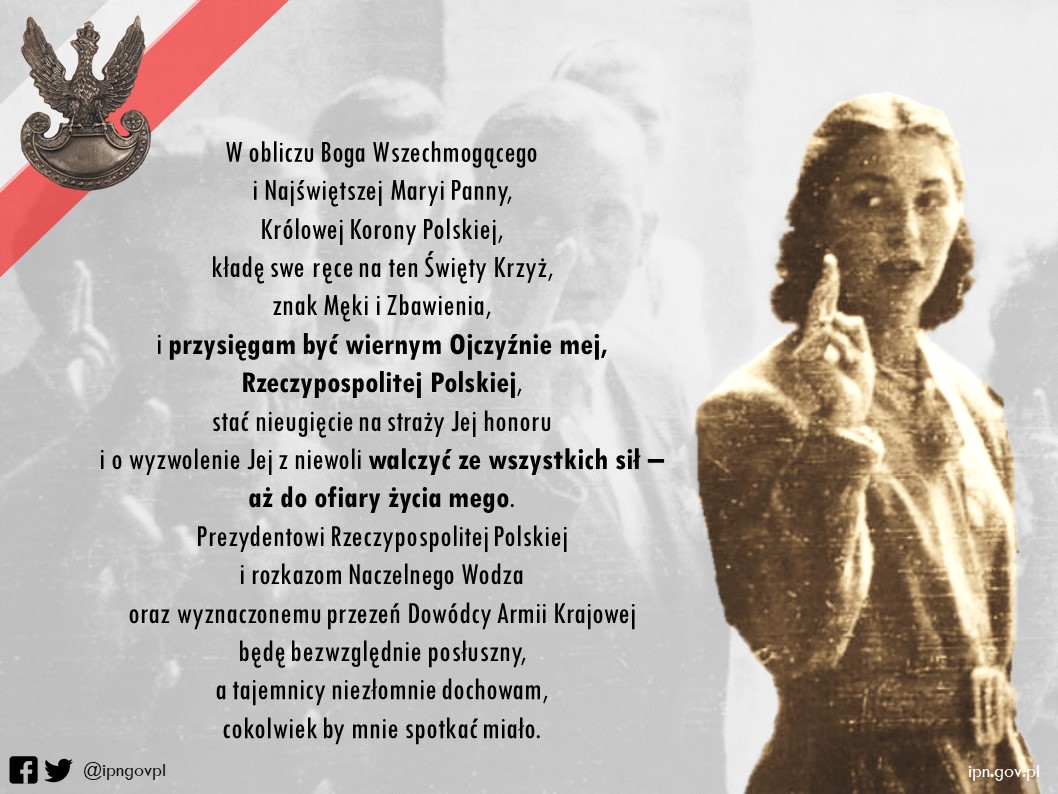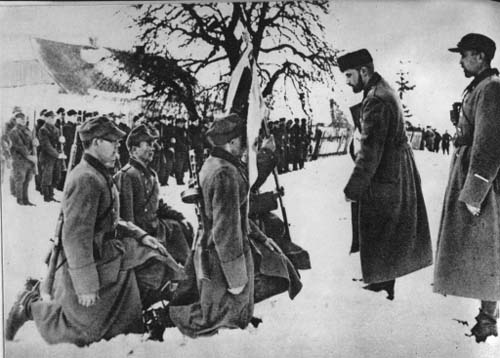On 27 September 1939, the first all-Poland underground organisation subordinated to the Government of the Republic of Poland was created - the Service for Poland’s Victory (SZP, from the Polish Służba Zwycięstwu Polski). Yet, the Polish government formed in exile had no doubts as to the political image of the SZP (associated with the pre-war “Sanation government”) and therefore decided to dissolve it and to establish – in its place – the Union of Armed Struggle (ZWZ, from the Polish Związek Walki Zbrojnej), an organisation directly subordinated to the authorities in exile. As early as in December 1939, the Commander-in-Chief ordered the consolidation of the whole underground under the ZWZ. A relevant resolution of the Council of Ministers announced the following:
“All related organisations existing in the country have to submit to the commanders of the ZWZ appointed by the Commander-in-Chief.”
However, it is not the name of the ZWZ that is nowadays a symbol of resistance of Polish society against the occupying forces. The all-Poland organisation formed in 1939 is viewed as the Home Army (AK, from the Polish Armia Krajowa) by the whole of Polish society. The name “Home Army” was first officially used on 14 February 1942, the name being a symbol and extending to almost all military efforts by the Polish underground.
The Home Army
On 14 February 1942, a cable from General W. Sikorski reached the Homeland. It was addressed to General S. Rowecki “Kalina”:
Following my order L2926 from 3 September 1941 1. I abolish for external use of the name ZWZ. All soldiers on active military duty in the Homeland make the Home Army subordinate to the General as its commander 2. The General`s post is called the Commander of the Home Army […] Commander-in-Chief Sikorski, Lieutenant-General.
Thus, the change of the name from the Union of Armed Struggle to the Home Army was to show that the struggle was ongoing in Poland, that sabotage operations were being undertaken, and that the great armed action, i.e. the general uprising (Operation Tempest (Polish - Akcja “Burza”)), was being prepared. The Home Army was ceaselessly fighting the occupying power and therefore constituted an important contribution to the armed operations of the anti-Nazi coalition.
While this may seem to be a mere change of name, nothing could be further from the truth. First and foremost, the change of the name from ZWZ to AK was a material political act. Freshly established relations between the Polish and Soviet governments did not prognosticate positive effects of cooperation. The Soviets’ reluctance towards the formation of the Polish Army in the USSR, which was independent of the influence of the Soviet authorities, was easily visible. Also there was a clear tendency to divide the forming army into small units, which — sent separately to the front — would be massacred. In such case, the Polish Army in the USSR would no longer be a political problem.
The Soviets took General Władysław Ander’s reluctance to pursue such tactics as a sign of a lack of engagement on the part of Poland in the fight against the Third Reich and the Axis powers. Thus, the change of the name from the Union of Armed Struggle to the Home Army was to definitely show that the struggle was ongoing in Poland, that sabotage operations were being undertaken, and that the great armed action, i.e. the general uprising (Operation Tempest (Polish Akcja “Burza”)), was being prepared. The Home Army was ceaselessly fighting the occupying power and therefore constituted an important contribution to the armed operations of the anti-Nazi coalition.
The change of the name from ZWZ to the Home Army had also a symbolic dimension. It clearly showed that there were three parts of the Polish Armed Forces: the Polish Army in the West, the Polish Army in the USSR, and the Home Army, the latter of which carried out the most intensive armed struggle. Another reason for the change of name was the process of consolidation of all underground armed forces in Poland. Numerous underground organisations started to be formed in the country under occupation. They were formed by political groups, social organisations or soldiers themselves.
Consolidation action
As early as towards the end of 1939, numerous underground organisations were formed throughout the country. Some of them were destroyed by the Gestapo, the NKVD and the Lithuanian Security Police (also known as Saugumas), and others survived that first period and thus learnt how to operate underground. However, efforts to consolidate these organisations proceeded quite slowly, impeded by both the ambitions of the leaders of individual organisations as well as mistrust towards organisation whose political nature raised concern. The main fear was that the Union of Armed Struggle would continue the pre-war “Sanation policy”. For many underground activists, the pre-war government accused of being responsible for the September defeat was an element that they did not want to accept (the only exclusion was the Vilna Region, where the “Sanation” groups served an important role in underground activities). In order to emphasise the apolitical nature of the military organisation, it ceased to be the Union and became the Home Army, a part of the Polish Armed Forces fighting for the independence of the Homeland. And this move quickly produced noticeable effects.
In practice, the Home Army was the focus of almost the entire patriotically disposed part of the Polish nation. Joint efforts led to bold military operations, such as the planned series of uprisings codenamed Tempest.
In the years 1942-1943, the operation of consolidation of military efforts in the Homeland made significant progress. Command of the Home Army was granted authority over the biggest armed organisations which had recognised the Government of the Republic of Poland but retained independence. They were as follows: the National Military Organisation (NOW, from the Polish Narodowa Organizacja Wojskowa), the armed forces of the National Party (SN, from the Polish Stronnictwo Narodowe) and the Peasants Battalions (BCh, from the Polish Bataliony Chłopskie), and the military organisation of the People’s Party (SL, from the Polish Stronnictwo Ludowe). Smaller organisations also fell under its command. The number of enlisted soldiers of the Home Army would soon exceed 300,000 people. Only a small fraction of the National Armed Forces (NSZ, from the Polish Narodowe Siły Zbrojne) (the so-called Szaniec Group (Polish Grupa Szańca) that caused the split in the NSZ in 1944) did not join the Home Army, as there was still mistrust as to the direction of the activities undertaken by the rest of the underground. Furthermore, the NSZ believed that the Soviet Union was an enemy of Poland in the same way Nazi Germany was, and they treated the Soviet Union accordingly. This resulted in reluctance to consolidate with the Home Army, which declared intelligence and military cooperation with “the ally of our allies”
In practice, the Home Army was the focus of almost the entire patriotically disposed part of the Polish nation. Joint efforts led to bold military operations, such as the planned series of uprisings codenamed Tempest. Having relied on hundreds of thousands of volunteer soldiers, plans were prepared to reconstruct the Armed Forces, which were to continue fighting as a regular army. The name of the Home Army also united people after its formal dissolution. The organisations which were still involved in underground operations and continued the struggle for independence against the communist occupying power assumed such names as the Resistance of the Home Army, the Citizen’s Home Army, or the Home Army of Vilna District. Relations from the post-war period often refer to “our Home Army soldiers”, meaning armed underground agents fighting for independence. Also, in subsequent periods, the name of the Home Army was one of the most important symbols of independence.
Research carried out by the Institute of National Remembrance throughout Poland resulted in the determination that at least 955 youth organisations operated in the period from 1945 to 1956, especially after the defeat of the armed underground. At least a quarter of them referred to the Home Army in their name, and the majority based their operation on the ethos of the Home Army.
Why did the term “Home Army” replace the Service for Poland’s Victory and the Union of Armed Struggle in Poland’s collective memory? The word “Army” sounds evidently different than “Service” or “Union”. It is better associated with the act of fighting, is more decisive in terms of propaganda, and definitely better reflected the reality of the situation. In the epoch-making work published in London in 1940s concerning the history of the Polish Armed Forces, the volume dedicated to the Polish Underground State was entitled The Home Army. Therefore, it is safe to say that the order issued in February 1942 was somehow the legitimisation of the existing situation. The soldiers of the underground viewed themselves more as the soldiers of the underground army than members of the conspiracy union or service. In their opinion, that name was definitely a more accurate description of their activities. This is one of the reasons why the date of 14 February 1942 ought to be remembered.

The oath of the Home Army soldiers
Any person joining the ranks of the Home Army would swear the following oath:
Before God Almighty and the Blessed Virgin Mary, Queen of the Polish Crown, I hereby put my hand on this Holy Cross, the sign of the Passion and Salvation, and I pledge allegiance to my Fatherland, the Republic of Poland. I pledge to steadfastly guard Her honour, and to fight for Her liberation with all my strength, even to the extent of sacrificing my own life. I pledge unconditional obedience to the President of Poland, the Commander-in-Chief of the Republic of Poland, and the Home Army Commander whom he appointed. I pledge to resolutely keep secret whatever may happen to me.
And the person accepting the newly enlisted member would respond as follows:
I hereby accept you into the ranks of the Polish Army, fighting its enemy in conspiracy for the liberation of the Fatherland. Your duty shall be to fight with arms in hand. Victory shall be your reward. Treason shall be punishable by death.
Author: Piotr Niwiński
